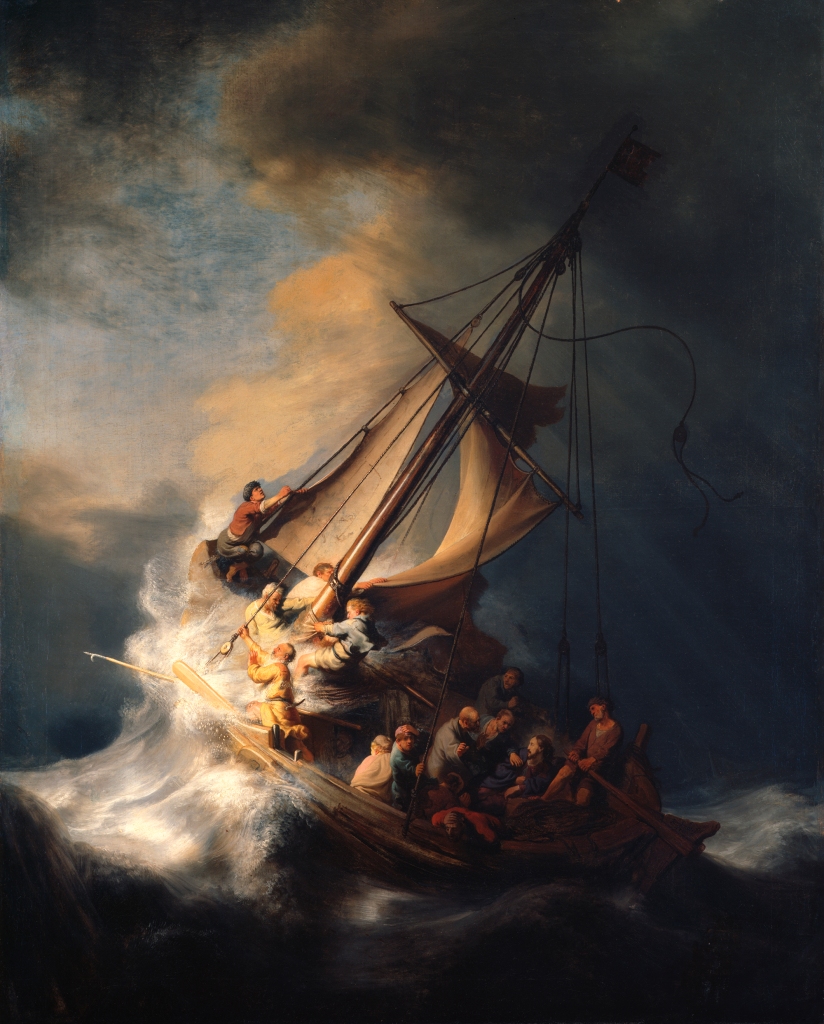
Recently I have been reading through the gospel of Luke. A few days ago my reading was from the well-known story of Jesus calming the storm. It begins like this:
One day Jesus said to his disciples, “Let us go over to the other side of the lake.” So they got into a boat and set out. As they sailed, he fell asleep. A squall came down on the lake, so that the boat was being swamped, and they were in great danger. The disciples went and woke him, saying, “Master, Master, we’re going to drown!” (Lk. 8:22-24a)
There on the lake, the disciples are meant with a danger that they cannot control. A storm is a thing of chaos. It’s destructive. And it is beyond our ability to really manage. Even 2000 years after that storm in Galilee, we are unable to control the weather. Tornados and hurricanes come whether we plan for them or not, and we can’t divert their paths. Blizzards, droughts, windstorms – they’re all beyond our reach.
The coronavirus pandemic isn’t so different. On the Every Thought Captive Podcast, my old professor Doug Welch described the pandemic as the slowest-moving tornado in history. It is chaotic and destructive, just like a storm, but it doesn’t seem to be in a hurry to leave. So like the disciples in the boat, we feel that we are being swamped. The pandemic crashes in on us like waves against the sides of the hull, and like the disciples, we find ourselves crying out, “Master, Master, we’re going to drown!”
Luke’s account continues:
He got up and rebuked the wind and the raging waters; the storm subsided, and all was calm. “Where is your faith?” he asked his disciples. In fear and amazement they asked one another, “Who is this? He commands even the winds and the water, and they obey him.” (Lk. 8:24b-25)
These past few days, I’ve been struck by that question Jesus asks his shipmates. “Where is your faith?” I wonder if he is asking us the same question today.
The pandemic has done many things, and I believe that one of those things has been to expose our idols. In our modern world, we tend to place our trust in a people and institutions other than God. We turn to them for a security and safety. But this year, we have been forced to acknowledge that, in the face of a storm, they have been unable to live up to the hopes we have for them.
Is your trust in the economy? We’ve seen unemployment rise, businesses shutter, and markets stumble.
Is your trust in politics? Our leaders have been unable to provide a coherent strategy for dealing with the virus.
Is your trust in technology? Even with all of the advances we have made over the centuries, all of the best minds of our world haven’t been able to prevent the 600,000 global deaths (and counting) from the virus.
Is your trust in education? Our schools and universities are struggling to figure out what education looks like this fall in light of the crisis.
As a human race, we are so confident in the things we have built. We are the people of Babel, erecting our tower to make our name great and to prevent ourselves from being scattered. But in spite of our ingenuity, a microscopic strand of RNA has brought all our striving to a halt.
So where is your faith? That’s the question I’ve had to wrestle with this week. Is my faith in myself? Is it in my society? Is it in the works of human hands? Is it in what we have built? All of these have proven inadequate.
So let’s put our faith in the one who calms storms. Let’s put it in the one who is Lord over all things (even pandemics). Let’s use this season, as frustrating and frightening as it is, to allow our idols to be stripped away and to place our trust only in the one who “commands even the winds and the water, and they obey him.”
The disciples made it to the other side of the lake, and I believe our world will make it to the other side of this pandemic. I hope we reach the other shore as different people than we were when we set sail. I hope we have more humility, more faith, more trust in our Storm-Calmer.
Granted, when the disciples got to the other side, they were met by a demon-possessed naked man. I hate to think what the epidemiological parallel to that would be, but let’s hope it stays where it is for a while!
